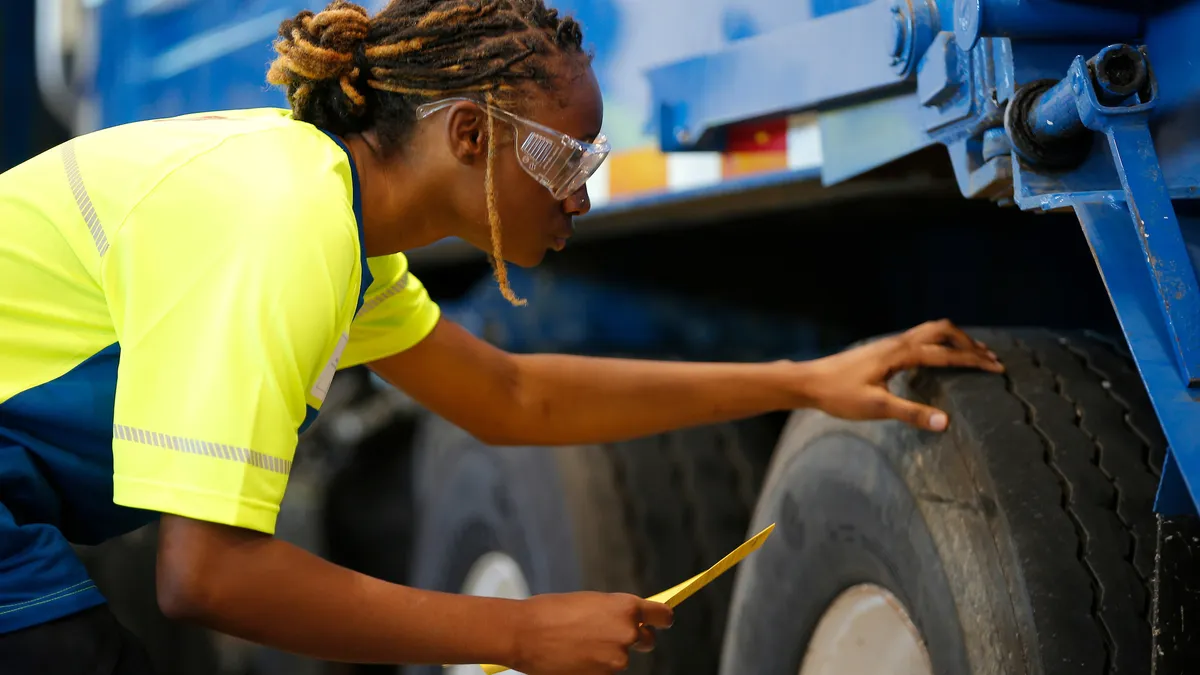Dive Brief:
- Republic Services has launched its own technical institute to train and retain diesel technicians as one strategy to address far-reaching staffing shortages in the solid waste industry. The institute entails a 12-week program based in Dallas that covers expenses and housing for out-of-area participants and pays them for their time before transitioning them into jobs with the company.
- Republic is recruiting both within its existing employee base and externally; of some nine individuals in the program's pilot class in July, seven were already working for Republic, said Misty Ross, the institute's director. A class of 13 people is running currently, Ross said, and the institute intends to have eight classes in 2022, with room for up to 108 people.
- The program was developed in conjunction with the U.S. Department of Labor and trade school Lincoln Tech. While the institute's immediate focus is the Dallas program, it plans to offer advanced training and retraining opportunities throughout the country to Republic's existing technicians.
Dive Insight:
Republic employs over 2,000 technicians for its hauling vehicles nationwide, and it's trying to solve its retention issue, just like every other company, said Ross, who previously worked with diesel and automotive companies during a tenure at the for-profit technical colleges system Universal Technical Institute. The way Republic has set up its on-site program, "it takes a lot of those barriers out for individuals that want to get into this industry that, maybe they can't afford tools, maybe they have a family and they can't go to school at the same time," she said.
Ross said the company is casting a "wide net" among anyone who is eligible to work in the U.S., and no prior training or experience is required. Republic's announcement specifically names veterans, recent high school graduates and "individuals from underserved areas" among the potential candidates it's targeting.
Women are just 4% of all diesel technicians across industries, according to a survey led by the Women In Trucking Association and Freightwaves. Association President and CEO Ellen Voie said in an email that the cost of training and materials can be a barrier to entry, but a bigger issue can be women not realizing they're capable of being diesel technicians.
"As long as [employers] encourage and support women in these roles, they can fill a need with an untapped demographic," Voie said.
The Republic Services Technical Institute intends to expand its training reach to existing technicians at different levels. "If they need to retrain, or if they need to go back through and refresh in any areas, a lot of that can be determined based on the performance because we do a lot of quality checks behind their repairs," Ross said. "So if we identify areas that maybe they need to fill a gap, we will be training to bring them up to speed as needed. And then, the focus would be to continue advancing their knowledge throughout the rest of their career." Ross said the institute will look to develop those plans and that curriculum within the next year or two.
Part of that growth plan includes training technicians to work on electric trucks. Republic is one of the major public waste companies that's been more enthusiastic about testing electric refuse trucks in the short term and embracing them in the long term. Ross said that the institute is designed such that participants receive basic electrical training initially and then could learn more advanced skills in the future. Beyond the Dallas-based apprentice program, the institute aims to "provide [ongoing training] for every technician that is currently working for us, no matter what the level is, leading up to electrification."
Travis Buholtz, a technical advisor at the Electrification Coalition, described a "chicken or the egg" situation for companies in sectors considering electrification: They must think about training people to maintain electric vehicles as they look to scale up their fleets. "If there aren't people deploying these vehicles, do we need technicians? But then the flip side is, if there aren't technicians, then I don't want to buy these vehicles."
"There's a lot of momentum going towards electrification," Buholtz said. "And I think having those technicians trained on both [diesel and electric] will attract more deployment of electric trucks because there'll be a level of comfort knowing that those vehicles are going to be maintained. And then both systems kind of feed into each other."












